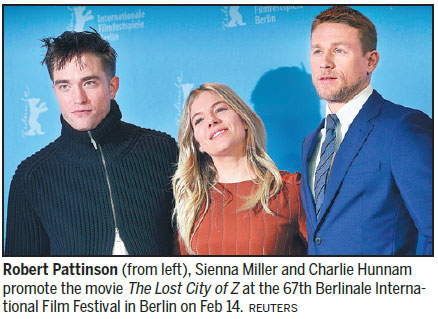Lost City of Z explores the hunt for a vanished civilization
By Deborah Cole in Berlin (China Daily) Updated: 2017-02-16 07:40British actors Robert Pattinson and Charlie Hunnam star in the true-to-life jungle adventure story The Lost City of Z about the ill-fated search for a vanished South American civilization.
The movie, given its international premiere at the Berlin film festival on Tuesday, was directed by US filmmaker James Gray (The Immigrant) and is based on a bestseller by David Grann, a New Yorker staff writer.
Hunnam, best known from the Sons of Anarchy television series, plays Percy Fawcett, a British mapmaker and explorer who believed there was an advanced society in the Amazon long before the arrival of the Europeans.
Pattinson, the heartthrob from the Twilight franchise, is his aide-de-camp Henry Costin, who joined him on several treacherous expeditions before and after World War I looking for what Fawcett called The Lost City of Z.

Sienna Miller (Foxcatcher) appears as his wife Nina, an independent woman with a taste for adventure who longed to accompany Fawcett on his travels but stayed back in England to raise their three children.
The story plays up both the lengths to which Fawcett would go for recognition in Britain's rigid class system, as well as his progressive streak, with a desire to disprove Western notions of cultural superiority.
Gray says those ideals appealed to him given the "wave of nationalism that's gripping the world" today.
"The whole world, the human race, has this terrible urge, need, desire, tendency to rank, to put people into categories," the director tells reporters in Berlin.
"The movie unfortunately is, I think, as relevant as ever because we cannot close the book on what is clearly a - let's be honest here - white and very racist, colonialist view of the world."
Gray says his team spent weeks working with four native tribes in the Amazon but he resisted the urge to make an "anthropological movie" focused on exotic differences.
"I was terrified of course of being condescending," he says. "I think we need to be reminded that we're all made of the same clay."
The film features encounters with native peoples during the treks, which were shot in Colombia, set against vivid World War I battlefield scenes from the Belgian trenches.
"I thought it was essential story-wise because it would really give full color to the lie that is the idea of the advanced European civilization," he says.
Faced with growing scepticism at home and a chronic lack of financing, Fawcett, a gifted storyteller, managed to capture the imagination of newspaper editors around the world, sending them breathless dispatches in exchange for cash.
The articles made him a global star in his lifetime, and heightened the tragedy around the mystery of his eventual disappearance in the Amazon in 1925 alongside his son Jack.
Hunnam says the work on set had been hairy at times, with scorpions, snakes and poisonous spiders often coming too close for comfort.
"It was pretty adventurous, he says. "There were all manner of things on any given day that thought it might be a nice idea to bite and attempt to kill us."
Pattinson, who has branched out to more adult fare in recent years, appearing in David Cronenberg's Maps to the Stars and Cosmopolis, says it was fun getting out of his comfort zone.
"When I first read the script, I loved there being areas of the world that you could still explore and were totally uncontrolled," he says.
He says today's hyper-connected world "takes away that mystery and kind of majesty of going into the unknown".
The Berlin film festival runs until Sunday.
Agence France-Presse
- 'Cooperation is complementary'
- Worldwide manhunt nets 50th fugitive
- China-Japan meet seeks cooperation
- Agency ensuring natural gas supply
- Global manhunt sees China catch its 50th fugitive
- Call for 'Red Boat Spirit' a noble goal, official says
- China 'open to world' of foreign talent
- Free trade studies agreed on as Li meets with Canadian PM Trudeau
- Emojis on austerity rules from top anti-graft authority go viral
- Xi: All aboard internet express











